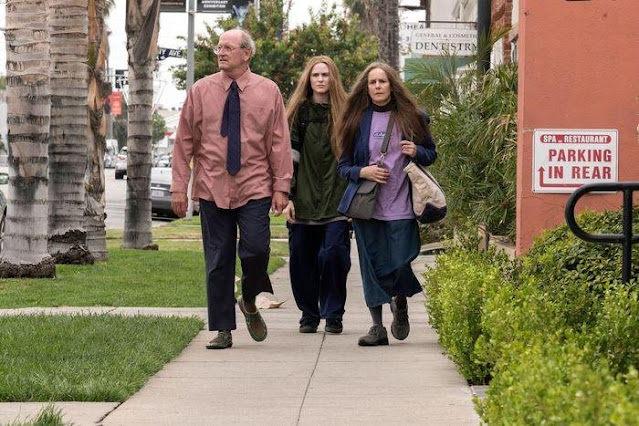This review is not going to contain spoilers but it is going to talk about the film in detail so if you wanted to watch it and feel like this would spoil it for you, then here is your warning to stop reading and go and watch the film.
*
I've never seen a Miranda July film before this one, but I know that she is very much an indie darling, with her films being labelled as "quirky" from people who don't know how to use a thesaurus. I'd seen this film floating around on Letterboxd with people praising it heavily for its representation of queerness as well as a distinct kind of trauma, the kind a parent can inflict. I was quite excited to watch it.
Kajillionaire (2020) follows a young woman named Old Dolio and her parents as they commit a series of petty crimes, many of which seem to bring up very little money. As Old Dolio is made to venture outside her family, both through attending an expectant parents seminar and through the introduction of Melanie, another young woman who Old Dolio's parents seem to take a liking to, she is forced to see the ways in which her parents neglected her growing up and how being made to live a life of crime has frayed any intimate relationship she could ever have with them.
 |
| Source: EXBERLINER |
This film is accessible in spite of its fairly bizarre premise because of its portrayal of an unhealthy parent-child relationship that is not played in a super serious way. There is plenty to laugh at here despite the tragedy of watching a woman come to the realisation that her parents robbed her of her childhood, and any of the intimacy that may come with that, to use her for their own ends. The protagonist's parents are presented as emotionally immature, forcing their child to become an adult, and thereby an extension of themselves, before she was ready to do so, before she was ready to realise who she even was as a separate person.
In terms of genre, this film very much mocks the idea of the heist film, where there is a plan to do a big 'job' that will solve each of the characters' problems. Rather, the reality seems to be that this family must complete a series a small crimes daily in order to maintain their already frugal lifestyle, deliberately living in an abandoned office building that is leaking soap which they continuously fail to pay rent on. It seeks to analyse and bring down to earth the idea that a large scale heist could even be committed and the competence it would take to do so. These criminals do not seem entirely competent, despite their marginal success, and their crimes often involve ripping off people who cannot defend themselves. The big haul at the end of the film, typical of the genre, is not a satisfying one, but instead shows a betrayal of trust between the criminals, actively severing the bond that kept them together for so long. It tracks that what the protagonist actually gained from this experience was self-realisation and healthy boundaries with those who refused to set any.
It's also strong coming-of-age story that suggests, for many people, growth of character doesn't really happen until your twenties, even if most of the films in this genre are set during people's teenage years. This relates so well to the film's portrayal of queerness, how most queer people don't get to have the traditional childhood/teenage romance that straight people do, and that this lack of intimacy during this time, especially when it isn't being supplemented by familial or platonic relationships, can be deeply traumatising. To cope, the protagonist attends a workshop designed around caring for newborn babies where she learns how she should have been treated and what she has been missing out on. Ironically, it is by reverting to that of a newborn baby and allowing herself to be touched in such a way that she is able to realise what she wants as an adult.
 |
| Source: Roger Ebert |
In terms of queerness, this is all I could ask of a film. The relationship between Old Dolio and Melanie develops like that of a heterosexual romance on screen, where a bizarre scenario throws them together. It's complex and interesting, and doesn't end in tragedy. It's an incredibly low bar that I ask that sapphic relationships on-screen should be between people who have chemistry and that their relationship isn't the whole point of the film, but I'm very glad Kajillionaire attempts to try something different.
This film is billed as a comedy, and whilst it does have its funny moments, it is extremely tragic in its repeated destruction of fantasy. The big heist becomes a betrayal. The cool parents who involved their child in on their crimes are in fact neglectful and refused to set any boundaries. The coming-of-age story becomes one where the protagonist must lose a lot, like her family, in order to develop into her own person. This is a story of loss and what we must learn from that loss. It's about moving out of a space that is pouring soap through the cracks in the ceiling so that you can grow.
*
Thank you for reading this post! If you enjoyed it, please consider donating to my Ko-fi. It's a one time donation of £1 and it would really help me out x